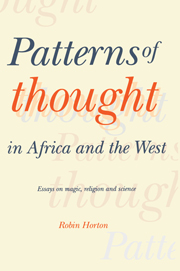Book contents
- Frontmatter
- Contents
- Acknowledgements
- Introduction
- BEGINNINGS
- MAINLY CRITICAL
- 2 Neo-Tylorianism: sound sense or sinister prejudice?
- 3 Lévy-Bruhl, Durkheim and the Scientific Revolution
- 4 Back to Frazer?
- 5 Professor Winch on safari
- 6 Judaeo-Christian spectacles: boon or bane to the study of African religions?
- MAINLY CONSTRUCTIVE
- Postscript
- Notes
- Bibliography
- Index
6 - Judaeo-Christian spectacles: boon or bane to the study of African religions?
Published online by Cambridge University Press: 05 June 2012
- Frontmatter
- Contents
- Acknowledgements
- Introduction
- BEGINNINGS
- MAINLY CRITICAL
- 2 Neo-Tylorianism: sound sense or sinister prejudice?
- 3 Lévy-Bruhl, Durkheim and the Scientific Revolution
- 4 Back to Frazer?
- 5 Professor Winch on safari
- 6 Judaeo-Christian spectacles: boon or bane to the study of African religions?
- MAINLY CONSTRUCTIVE
- Postscript
- Notes
- Bibliography
- Index
Summary
For much of the past fifty years, the study of the indigenous religious heritage of Africa has been dominated by social or cultural anthropologists of Western origin and agnostic or atheistic religious views. In recent years, however, the dominance of this set has been challenged by a new wave of scholars, some Western and others African, who repudiate the established approach to the field and advocate a radically different one. Some of these scholars, such as Evans-Pritchard and Victor Turner, have been anthropologists by formal professional affiliation. Others, like Idowu, Mbiti, Gaba and Harold Turner, have been affiliated to such disciplines as theology and comparative religion. Yet others, such as Winch, have been philosophers. They are united, however, by a methodological and theological framework which has been strongly influenced, first and foremost by their own Christian faith, but also by a long tradition of comparative studies of religion carried out by Christian theologians.
The only outsider to have taken the challenge of the new wave of scholars at all seriously seems to have been the Ugandan poet/anthropologist Okot P'Bitek, who gave us a devastating exposé of some of the weaknesses of the new approach in his little book African Religions in Western Scholarship. The book, however, was written in a furious, poetic, acid style rather than in cool, sober academic prose. And although some people, myself included, found this style both splendid and apt, it seems to have allowed many academics both old-style and new to convince themselves that p'Bitek's critique could be shrugged off.
- Type
- Chapter
- Information
- Patterns of Thought in Africa and the WestEssays on Magic, Religion and Science, pp. 161 - 194Publisher: Cambridge University PressPrint publication year: 1993
- 1
- Cited by

